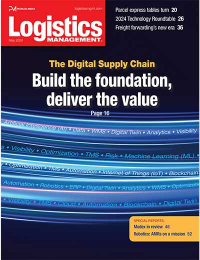EY and UN Collaborate on Climate Change and Supply Chain Study
Latest Logistics News
Inflation continues to have a wide-ranging impact on supply chains, notes Blue Yonder survey National diesel average decreases for the fifth consecutive week, reports EIA New Union Pacific service connects Southern California and Chicago STB Chairman Martin J. Oberman retires LM reader survey drives home the ongoing rise of U.S.-Mexico cross-border trade and nearshoring activity More NewsEY Climate Change and Sustainability Services (CCaSS) recently collaborated with the UN Global Compact on the study in an effort to better understand how companies are managing their supply chains in ways that support the objectives of the United Nations 2030 Agenda and Sustainable Development Goals (SDGs).
The UN Global Compact is the world’s largest sustainability initiative and EY has been a participant since 2009.
The report draws on business inputs across geographies, sectors and business models. CCaSS and Advisory Supply Chain and Operations professionals interviewed 70 clients globally to explore how they are embedding sustainability in their supply chains by managing risks and adopting new commitments around human rights, the environment and the well-being of communities in which they operate.
Overall, the study indicates that by improving environmental, social and governance (ESG) performance throughout the supply chain, companies can enhance processes, reduce costs, increase productivity, innovate, differentiate and improve societal outcomes.
Conclusions explored in the report include:
• Companies are on a continuum from managing risks through creating shared value with stakeholders to achieving differentiation for their products or services;
• Leaders are achieving competitive advantage in the supply chain through increased collaboration, technology innovation, greater efficiency and supplier diversity;
• Mature supply chain models integrate buying and sourcing practices with product design and development to enhance sustainability results tied to their manufacturing and service delivery;
• Currently, only a small percentage of companies have achieved leadership maturity levels that can lead to shared value with suppliers, enable suppliers to operate as an extension of the business and engage in meaningful, collaborative dialogue.
Based on interviews we identified several actions companies can take to further embed sustainability in their supply chains:
• Assess materiality, to focus on the most pressing issues, taking UN Global Compact principles into consideration
• Align resources, structures and processes to focus on supply chain sustainability across the organization
• Train management and suppliers on market practices
• Invest in diverse and inclusive supply chain partners
• Stretch existing sustainability goals beyond direct operations, to include tiers of the supply chain
• Deploy technology to increase accountability and transparency
• Leverage buying power and influence to trigger shifts toward supply chain sustainability
• Disclose supply chain information, beyond stand-alone sustainability reporting mechanisms

Article Topics
Latest in Logistics
Inflation continues to have a wide-ranging impact on supply chains, notes Blue Yonder survey National diesel average decreases for the fifth consecutive week, reports EIA New Union Pacific service connects Southern California and Chicago Automate and Accelerate: Replacing Pick-to-Light with the Next Generation of Automation STB Chairman Martin J. Oberman retires LM reader survey drives home the ongoing rise of U.S.-Mexico cross-border trade and nearshoring activity A buying guide to outsourcing transportation management More LogisticsSubscribe to Logistics Management Magazine

Find out what the world's most innovative companies are doing to improve productivity in their plants and distribution centers.
Start your FREE subscription today.
May 2024 Logistics Management

Latest Resources














